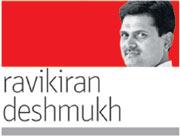The clamour for going it alone in the assembly elections in the state in October is getting louder from both the ruling Congress-NCP and opposition BJP-Shiv Sena camps

 The clamour for going it alone in the assembly elections in the state in October is getting louder from both the ruling Congress-NCP and opposition BJP-Shiv Sena camps. One of the main reasons for this is the BJP’s spectacular win at the Centre, which saw it attain a sole majority a feat eluding all parties since 1984.
The clamour for going it alone in the assembly elections in the state in October is getting louder from both the ruling Congress-NCP and opposition BJP-Shiv Sena camps. One of the main reasons for this is the BJP’s spectacular win at the Centre, which saw it attain a sole majority a feat eluding all parties since 1984.
ADVERTISEMENT
Maharashtra has also not seen a single-party government for nearly 20 years. The Shiv Sena-BJP combine ruled from 1995 to 1999 with the help of independent MLAs, and the current ruling dispensation has been in place ever since.
The absence of decisive leadership at the state level is one of the key reasons for the state not getting a single-party government. Even NCP chief Sharad Pawar, who is well versed in state politics and is known for his political acumen, has not been able to lead his party to a single-handed victory, be it in 1980 or 1985, while leading the Congress (S); or since 1999, as the head of the NCP.
Same is the case with the Shiv Sena, which could not get 100 seats on its own even during the days of the late Bal Thackeray. Out of 288 state assembly seats, Sena fights on 171 seats and the BJP on 117. The distribution of seats between the Congress and NCP is more or less similar.
It is not difficult to see that alliance governments have not proven beneficial for the inclusive growth of the state, owing, largely, to the lack of quick and timely decision-making. Each decision is scrutinised using the yardstick of political benefits accruing to the alliance partner. The famous remark of ‘paralysis’ in the signing of files, made by Sharad Pawar for Congress Chief Minister Prithviraj Chavan, is ample testimony to this.
Paralytic
Alliance governments remain paralytic because each party wants to grow at the cost of the other, to be able to claim power on its own. In the case of the current ruling alliance, both the Congress and the NCP would be very happy to assume power alone.
In coalition politics, the deputy chief minister, the leader of the smaller alliance partner, always nurses the ambition of becoming the chief minister. The CM is thus forced to keep a wary, vigilant eye on the ambitious deputy CM. This has been seen in the state since 1995, and has been hurting its interests.
There have been umpteen examples of the Congress and the NCP blocking each other’s proposals. While the NCP alleged that the CM was trying to shut down the NCP-led MSRDC by delaying decisions on the water transport and sea link projects in Mumbai, the Congress has seen red over the NCP’s attempts to sanction funds to irrigation projects and strengthen cooperative institutions to consolidate its base in areas where it is stronger than the Congress. This game of one-upmanship has severely affected the overall growth of the state.
The infighting has also led to confusion among bureaucrats. Valuable time is lost in seeking the approval of both parties. Even simple things such as distribution of cheques to people affected by calamities take time, as they require signatures of both, the district guardian ministers and district coordination ministers appointed by the Congress and the NCP. In a single-party rule, the signature of the district guardian minister would have been enough.
The same thing has been seen in the Shiv Sena-BJP camp, which has been in the opposition since 1999. The parties have been pursuing their own distinct agendas, evidenced by the fact that they have their own group leaders in the state legislature, instead of electing one leader from the alliance. The BJP and Sena have taken different stands on many issues that could have put the Democratic Front government on the mat. Their joint efforts could have nailed the government, but personal equations came in the way.
Little wonder, then, that demands for contesting the assembly elections independently have been pouring in. Everyone, from Deputy CM Ajit Pawar to lower-rung leaders in the BJP, has been speaking on the need for this. While the BJP feels it has an upper hand compared to the Shiv Sena in their alliance, NCP feels it can avoid being a target of the anti-establishment mood by ending its alliance with the Congress.
It is also said that Pawar’s talk of going solo is to stall the mass desertion of NCP leaders in favour of the BJP and Sena. Today, the BJP thinks it has got the opportunity of its life to install its own CM by going it alone. And, irrespective of who comes to power, it is clear that the state needs a single-party government for its growth and progress.
The writer is Political Editor of mid-day
 Subscribe today by clicking the link and stay updated with the latest news!" Click here!
Subscribe today by clicking the link and stay updated with the latest news!" Click here!







